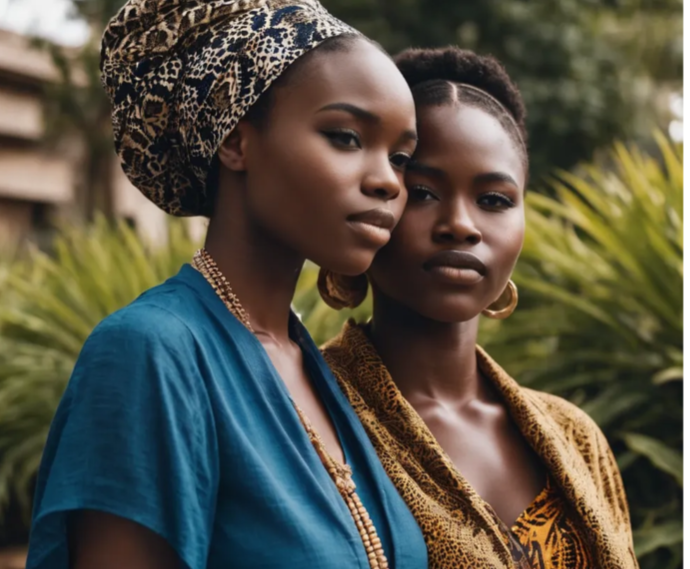
|
Getting your Trinity Audio player ready...
|
A long time ago, I had a love interest who believed his openly scathing disapproval of other women to be an affirmation of his ‘preference’ for me. The way he said it, you’d think we were in a horse race — he, the gambler weighing his odds; me, the clueless jockey tasked with riding and guiding the horse of my femininity to the prize at the finish line, his approval. Should he bet on the horse with a more athletic form? A jockey with more racing experience? With every backhanded compliment, he counted the costs of his bet. “Look at what that one is wearing. Thank God for you know how to dress.” “You are not like other girls. Those ones that don’t know what they are doing.” “I love the way you go to church. You no be like some of your mates.” If I didn’t know better, I might have been flattered. I mean, he thought I was the better bet, with features marked for winning.
This is the way of the world for many girls — thrust in a race with misplaced rivalry, questionable judges, and unrewarding prizes.
A battle for the gents…
“I think women are trained [to believe] that there’s only one spot for you and everyone has to fight like crazy for that one spot,” Rose McGowan, American actress and activist, says in an interview with Page Six.
This, I dare say, is nothing but the truth. Else, tell me why two beautiful girls, upon sighting each other, are thrown into mad tension — muscles coiled, heart thumping. “When you see a pretty girl walk in, you just look at her and start comparing yourself to her. It is a crazy reflex action I am trying so hard to destroy,” Indigo Sky confided. “Once in a while, a woman enters the room and I feel a bit uncomfortable, somewhat small.” Summer Nightingale confesses, both comments in response to whether they have ever felt pressured to compete with other women.
This largely unconscious territory-marking has been empirically proven by Tania Reynolds, in a paper published in 2021, as an instinct to guard ‘resource-yielding and commitment-inclined romantic partners.’ Using the historical challenges of female ancestors, the author proves that because women have historically been ‘denied independent access to cultural resources and forced to rely on men’s provisioning to support themselves and their children,’ they learnt to compete for romantic partners that could provide those resources long-term, thus turning their same-sex peers into primary competitors.
“It’s so embarrassing to say, but the competition was for male validation. I didn’t feel pretty enough and I became hyper-aware of what men would think of me.” Summer Nightingale tells me.
“I lived in a house where one guy held a sort of unofficial authority as the owner, and several women also shared the same space. It was clear that the guy was interested in me and another girl, and I must confess, I had feelings for him as well. However, I noticed that he was unsure about his own affections. One day, he’ll talk to me and the next day, he’ll talk to her. It appeared that I needed to step up my game and convince him why I should be the one he chose.” Violet Horizon shares. “I then observed that she [the other girl] went to great lengths to please him, doing everything she could around the house to gain his favour. She’d wake up early, do chores, and just do something he likes. I, too, felt pressured to do the same. The situation strained my friendship with this girl who, until then, had been a close companion. Even after leaving the house, an unspoken rivalry still lingers in the air and our once-thriving friendship has dwindled from a solid 10 to a mere 2. What were we competing for? The guy. I’m so disappointed in myself.”
…and everything else
Say someone somewhere snaps her fingers and suddenly, we — every woman around the world — arrive in a different world that is white, bright and without men. Would women still compete or feel pressured to do so? Whether directly or indirectly? I’d say yes. Removing men from the equation does not mean another woman would not want what the other has — social currency, beauty, the ability to light up every room, a senior position at work, and on and on. There is so much to covet, especially if you are someone who genuinely wants more for herself.
Nothing to be ashamed of.
“I would describe myself as a jealous person. It is not a trait I particularly enjoy having but I can’t help it sometimes. It affected my relationship with a friend who was in the same career path as me. First, I admired her progress but soon, I started to feel jealousy that nearly bordered on resentment. Even after speaking to her about it, the emotions continued. I had to delete her number to protect my peace of mind.” Crimson Rose confesses.
“The other women I feel pressured to compete with are women that have better backgrounds than me. When you have a better background, things would naturally move faster for you. I am quite an impatient person, so when I see that this person is doing so well and moving faster than me, I feel pressured.” Topaz Dream shares.
These are real emotions, real people.
So, what EXACTLY is the problem?
I do not dare speak on the cultural conditioning of women to compete for the male gaze. It is too much history, too much drama, too much anger. However, at the risk of seeming dismissive, I’d say competition is not intrinsically bad. In fact, competition occurs naturally between living things that coexist in the same environment. Animals of the same and even different species compete for everything — food, sunlight, water, a worthy mate. Even men compete for women. Not once, however, have they been declared each other’s worst enemies. For men, in fact, research has speculated that these competitions may even create stronger bonds of alliances and coalitions, even at the possible detriment of those outside that bond.
“One thing you need to know about men is that they do a lot of trauma bonding. They don’t communicate.” Summer Nightingale comments. “They don’t address issues. They move over issues, act like nothing has happened. That herd mentality, that brotherhood mentality will never make me feel safe in the midst of men because if a man wrongs me within a friend group, they will take his side.”
This proves one thing.
Animals compete.
Men compete.
Women compete.
For different things, of course.
And this can be a good thing, a great catalyst for growth among women even, as Grace confirms. “The competition drives me rather than affects my relationships with them. I would be like, ‘If she can do this, I can.’ I bet I would not be inspired to be more if these women didn’t exist in my life.”
But why, for the love of everything bright and beautiful, does female competition suggest that women are their own worst enemies? Why is contention amongst women, whether subtle or disturbingly overt, used as a tool to persist upon the narrative that women are wired to hate each other?
Pray tell.
This is what I think
It’s a little like racism. While the knack for thievery does not come genetically wired into any race, the criminalization of the average Black man makes every Black-pickpocket-unfortunate-enough-to-be-caught a headline for at least two weeks. In this case, men are from the mountains of Caucasus and they can do no wrong. This is why for some women like Amber Sunshine, experience has taught them that men indeed make better friends especially “…because they don’t really have time to harbour negative thoughts about women or be envious of them.”
And this is just something women are somehow adept at, or so they say.
Truth is the persistent narrative that suggests women are their own enemies is a product of historical stereotypes reinforced by the media and popular culture. These stereotypes have, in no small way, influenced how women approach relationships and interactions with other women — often with unfounded mistrust, internalised biases, unhealthy opposition, and harsh criticism.
There are many reasons why a woman would confidently say, ‘I don’t have any female friends and I don’t intend to’ and this article does nothing to invalidate some of the real experiences that may have birthed such principles. But more than anything, holding strong aversions to an entire group (especially to which one belongs) closes the door to the real conversations that make room for understanding, forgiveness and even well-meaning concessions.
So, what is the way forward?
It is that we understand this.
Women are not their worst enemies.
Women make great decisions, and poor ones — sometimes, in the same breath. They lie, and tell the truth. They cheat, and still fight for justice. Point is, they human the way others human. Neither black nor white. Just women.
For Sapphire Sea, her relationship with the women in her life has been proven to be the difference between life and death. “I was in a life-threatening situation at some point and my older sister managed to get me out unharmed. This is why I call her the umbrella — the umbrella that covers me and my siblings. Then there’s my female friend who really helped me in my finals, helped me overcome depression. She always has a way of sensing my moods and helps me get through my anxiety.” The same is also true for Etomi who revealed that when she went through a very tough experience, it was a woman that held her hands through the pain. “I can’t ever forget it.”
So, no. As a woman, the next woman is not your worst enemy. A woman is your strongest ally, the only other person who understands what it means to exist in your skin.
And as my girl, Coral Breeze, says, “Be a back bone for other women, close friends, relatives or even strangers. As women, we should actively act as connectors of opportunities for other women. Your friend’s success is your success. Be a woman always, take risks, be sexy, be ambitious, be enlightened for YOU.”
To the next girl, I hope you find your tribe.
I really do.
For there’s no experience as thoroughly fulfilling as being the object of a woman’s affections.







This is a healthy story that inspired unity amongst the womenfolk. Yes, competition exits but don’t let it consume you in a wrong way.